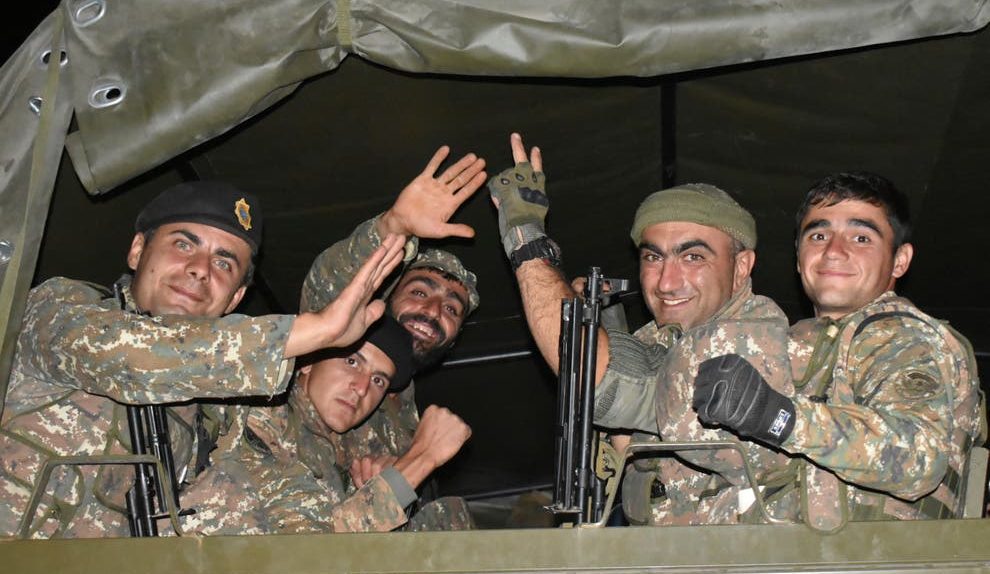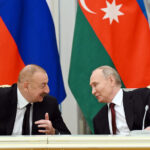Listening to Armenian politicians and experts, one cannot help thinking that they go out of their way to become subjects of political parodies. Most of their visions have nothing in common with popular discourse and fall into the category of phantasmagorias.
An Armenian expert shocked the public recently with his revolutionary revelation, saying that the opening of the Zangezur corridor is all but a prelude to a new war against Iran, who is about to announce that it has a nuclear bomb.
The expert concludes that the West should punish the headstrong opponent and Ankara and Baku. He says that the new communication lines will be used by Turkey to deliver military cargo to Azerbaijan in order to support hostilities.
Saying that the author struggles with political analysis would be an understatement. This person is stirring the minds of the audience with sensationalistic gibberish. What kind of professionalism is there to speak of?
The environment in the region is predictable, and the hard power factor is taking a back seat. The 44-day war has answered the questions that seemed hopelessly tangled until the fall of 2020. Experts voiced their concerns about the probability of a major regional bloodshed, but the hypothesis became irrelevant.
Stuck in zugzwang for so long and realizing the difficulty of this position, Yerevan tried to undermine the regional peace in an attempt to get out of its plight by internationalizing the conflict.
Baku excluded the involvement of third parties and rid the region of a great risk, putting an end to Yerevan’s attempts to rope extraregional forces into the power struggle. A lasting peace, which meets the expectations of the regional states, became the bearing element of the new composition. By defusing the destructive charge of the militarist Armenia, Baku acted as a trigger of the peaceful reorganization of the region.
The six-party platform that makes Armenian politicians recoil is a schematic configuration of the post-war period. Its texture shows the outlines of bilateral, trilateral and even quadrilateral action formats.
This unequivocal prospect suggests that Armenia itself will be included in the geoeconomic play, although it is the weakest link in the chain. The neighboring states show willingness to make use of the preferences collectively, but Yerevan trumpets an even more dreadful collision.
Should that collision happen, Armenia will be the first to get trampled underfoot, stripped of its protective bonds. Instead of giving up the vicious habit of winding up the risks, the “bright minds” announce new confrontations. After ruining its relations with Moscow, Yerevan introduced confusion into the relations with Tehran as well, clouded the sky in the Georgian direction, and played itself into a corner.
The problem is that it is not only analysts who are riding the subversive wave—the opposition politicians are right there with them. In fact, everybody who blows this fake off-key trumpet are cut from the same cloth. They cannot wait to turn the situation upside down—as long as they manage to knock the Civil Contract party off the pedestal and clear the road for themselves.
What an odd, if not outright monstrous, revanchist logic. Those opposing the peaceful reorganization of the region keep broadcasting that Armenia does not want the communications unblocked in the current situation, because, defeated in the war, it is entering the game without a handicap.
They even warn against Armenia becoming an object in this process—no one has the right to impose their will on it.
It gets worse.
Apparently, the regional players are developing projects, engaging in “geopolitical bargaining at the expense of the Armenian territories.” One might ask how Armenia intends to break out of stagnation while remaining still. At the expense of what—and whom?
Perhaps Paris, or Washington, or someone else. But Paris and Washington and everyone else is too far away, their vision is too blurred to play a constructive part. And yet those opposing Armenia’s inclusion in the regional coordinate system keep in good faith calling for help from abroad, believing that abroad must provide that help.
The frame of mind prevailing in that Armenian camp is clearly evidenced by a classic sentiment that only the morbidly self-important can nurture. “Opening the communications,” they say, “goes against our interests. This is all but a lie, because the unblocking of the communications comes at a price. Unfortunately, we are the ones who will continue to pay it.”
The context is far from new and reeks of typical patronizing and inexplicable arrogance. Where does this confidence that Armenians are always in the right and that everyone owes them come from?
It comes from the ingrained abnormal conviction that Armenians are always in the vanguard of humankind. As for the bargaining formula à la Arménien, it is “unless the sponsors pay up, the piper calls the tune of war”—and someone else has to pay for that tune, too.
A strange, hardly peace-loving signature move. But the credit of miracles is maxed out now. There will be no more wars, no more big fires, because the fatal threshold has been passed.
The time has come for reasonable actions, and those who cannot handle them will be lost and forgotten like an obsolete rudiment.
Tofig Abbasov
Translated from minval.az
Aze.Media










